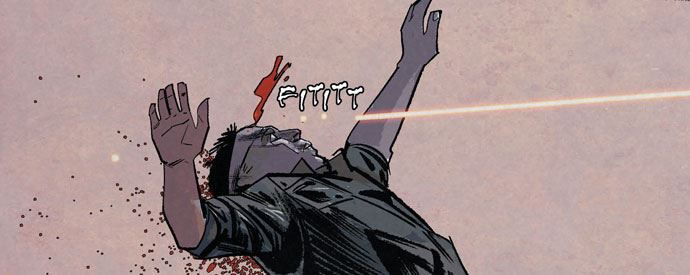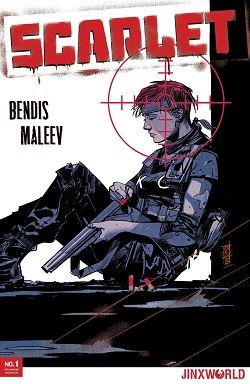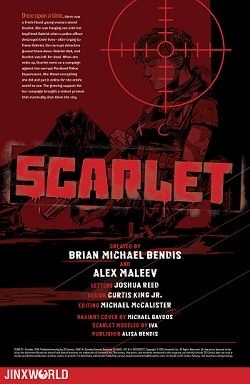- Comics
- Comics Reviews
- Manga
- Comics Reviews
- European Comics
- News
- Comics News
- Press Releases
- Columns
- Spotlight
- Digital Comics
- Webcomics
- Cult Favorite
- Back Issues
- Webcomics
- Movies
- Toys
- Store
- More
- About

By Andy Frisk
September 5, 2018 - 21:27
Brian Michael Bendis and Alex Maleev bring their dystopian political action/thriller Scarlet to Bendis’ new DC Comics imprint Jinxworld, and even if you’ve never read the original series, you can jump right in with issue #1.
In the near future, the City of Portland Oregon has undergone a revolt against The United States. Scarlet, our revolutionary protagonist, has apparently won control of the city. Her revolution started much like the plot of The Punisher over at Marvel Comics started, but followed the consequences of the killing of Scarlet’s boyfriend to a frighteningly plausible finale considering the contemporary reach of social media. Now, with Scarlet controlling the city, and a relative calm pervading in the middle of the fighting, Scarlet gets to wax political and go down some very revolutionary philosophical roads. For example, she muses that The American Experiment was “broken out of the gate” and “...started as a pile of shit. It was built on the economy of people taking advantage of others.” This is the line of thought that Scarlet uses to justify her revolution. Not everyone agrees though. There are those caught up in the fighting that don’t want any part of it, and those who have become unwilling collaborators. As the fighting winds down though, a surprising proposition arises that just might change everything. The controversial look at American history, which is laced with true observations-America was built on the back of slave labor-makes Scarlet a provocative, but philosophically engaging from a political theory standpoint. Personally, I would argue against Scarlet’s shortsighted view that we need “to start over from scratch,” as it betrays the progressive strain in American politics and the overall moral arc of the universe that the country (at least until the most recent setback, has mirrored), but her view provides a smart insight into the thought processes of revolutionary characters while making them relatable to. Scarlet seems poised to accomplish the same type of interesting exploration through familiarity of revolution and insurgency that Brian Wood’s DMZ did almost two decades ago. Scarlet is the type of comic book that Bendis is most suited to write. When he was at Marvel Comics, he was able to write stories that dealt with gritty political, social, and street life themes as that was pretty much always the Marvel tradition (and thankfully still is for the most part). His creator owned series, like the original Scarlet, often took these themes to an extreme, much like it is being taken to again here in this new volume of Scarlet. His masterful characterization, plot development, and thought provoking themes are best utilized here. His run on Superman has been mildly interesting at best, and just plain bad at worst. Bendis thrives in the gray areas that creator owned characters, or characters more gritty (like those at Marvel) thrive in. Bendis teams up with Alex Maleev here again and the result is reminiscent of the team’s glory days. Maleev is one of the most talented artists in comics working these days and his realistic and almost photogenic artwork keeps the reader at bay and allows the import of the story to demand your attention to work just as sharply as Bendis’ words do. The fact that Scarlet and her compatriots are so well defined visually keeps the reader from identifying with them, a tension that is in part relieved through Scarltt’s almost fourth wall breaking narrative. The total effect is that the reader really feels that Scarlet is a full formed and separate entity that is fully conversible with. It’s brilliant sequential art storytelling. Scarlet is Bendis and Maleev at their best, and you best better be reading this series.


Rating: 9 /10